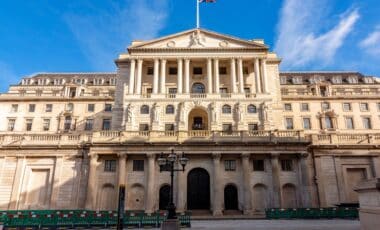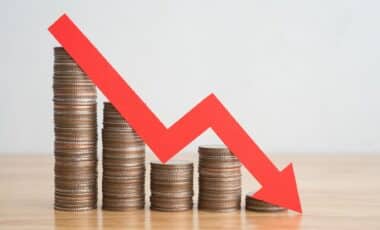The pound sterling has dropped to its lowest level in 14 months against the US dollar, reflecting mounting unease among investors about Britain’s fiscal trajectory. Simultaneously, UK borrowing costs are climbing sharply, signalling growing anxiety over the government’s economic management. As markets react to heightened uncertainty, Chancellor Rachel Reeves finds herself under intense pressure to stabilise a fragile economic outlook.
Market analysts warn that the current dynamics – falling sterling, surging bond yields, and waning confidence – are reminiscent of some of the UK’s past economic crises, drawing uncomfortable comparisons to the turmoil of 1976 and the mini-budget disaster of 2022. With global financial conditions tightening, the UK faces significant challenges in restoring investor trust.
Sterling Declines Amid Mounting Market Uncertainty
The pound fell sharply against the dollar, reaching $1.226, its lowest point in 14 months. This downturn was spurred by a rapid sell-off in the UK bond market, where yields on benchmark 10-year gilts climbed to 4.92%, levels not seen since 2008. Longer-term yields also surged, with 30-year bonds hitting a 28-year high of 5.47%.
The market’s reaction highlights deepening investor anxiety over Britain’s fiscal direction. Analysts note parallels with previous episodes of economic instability, including the 1976 IMF bailout. Martin Weale, a professor of economics at King’s College London, pointed to historical precedents, saying: “We haven’t really seen the toxic combination of a sharp fall in sterling and long-term interest rates going up since 1976. That led to the IMF bailout. So far, we are not in that position, but it must be one of the chancellor’s nightmares.”
Chancellor Rachel Reeves has sought to allay concerns, issuing back-to-back public statements asserting her control over public finances. Despite these reassurances, markets remain unconvinced, with bond yields and the pound both reflecting diminished confidence in the government’s economic stewardship.
Bond Market Jitters Expose Weakness in Sterling’s Resilience
The sell-off in the UK gilt market has struck a significant blow to the pound, raising questions about its perceived strength amid global economic pressures. For weeks, sterling had been viewed as a robust alternative to other currencies, particularly given the dollar’s dominance. However, the widening gilt spreads have undermined this perception, leading to a reevaluation of sterling’s “exceptionalism.”
Chris Turner, the global head of markets at ING, explained the dynamic: “Our best understanding of yesterday’s sterling sell-off is that the global bond market sell-off touched a raw nerve in the gilt market and that then the gilt spread widening prompted investors to cut back on overweight sterling positioning.” He added, “Investors had felt that sterling could best withstand the overriding strong dollar trend, but the gilt sell-off has dented that confidence in sterling, and traders’ long bets on the pound – betting that the currency will rise – could be pared as investors reassess sterling exceptionalism.”
The broader context includes rising UK borrowing costs, with government debt markets facing increasing pressure. While the pound remains far above the record low seen during the 2022 mini-budget crisis under Liz Truss, the current trajectory raises questions about the government’s ability to restore stability.
Economic Comparisons to Past Crises Intensify Pressure on Reeves
The parallels being drawn to previous crises have heightened scrutiny on Chancellor Reeves and her fiscal strategy. The most frequent comparisons are to the 1976 economic collapse, which forced Britain to seek a bailout from the International Monetary Fund, and the 2022 mini-budget debacle under Liz Truss and Kwasi Kwarteng, which sent markets into a tailspin.
While the current situation is less severe, the echoes of those crises are difficult to ignore. The sell-off in bonds and the decline of sterling reflect a fragile balance that could tip further if swift action isn’t taken to reassure markets. Reeves has emphasised her government’s “iron grip” on public finances, but market reactions suggest deeper concerns about the sustainability of her fiscal policies.
Adding to the pressure is the potential economic fallout from recent policy decisions. The Bank of England’s latest survey revealed that 61% of businesses plan to reduce profit margins, 54% intend to raise prices, and 53% expect to lower employment in response to Reeves’s proposed increase in National Insurance Contributions (NICs) for employers.
What Lies Ahead for the UK Economy?
While the pound remains above its all-time low of 2022, the challenges ahead are daunting. Analysts caution that without decisive action, the UK risks further deterioration in investor confidence, potentially damaging its economic recovery. Chris Turner’s observation highlights the challenge succinctly: “The gilt sell-off has dented that confidence in sterling.”
For Chancellor Reeves, the focus must now shift to demonstrating fiscal prudence while addressing the broader pressures facing businesses and households. Failure to navigate this precarious moment could deepen the economic malaise and complicate efforts to stabilise the country’s financial outlook.
As investors reassess their faith in sterling, the UK government must grapple with tough decisions to avoid sliding deeper into financial instability. The coming months will be critical in determining whether Britain can rebuild trust and resilience in an increasingly volatile global economy.









